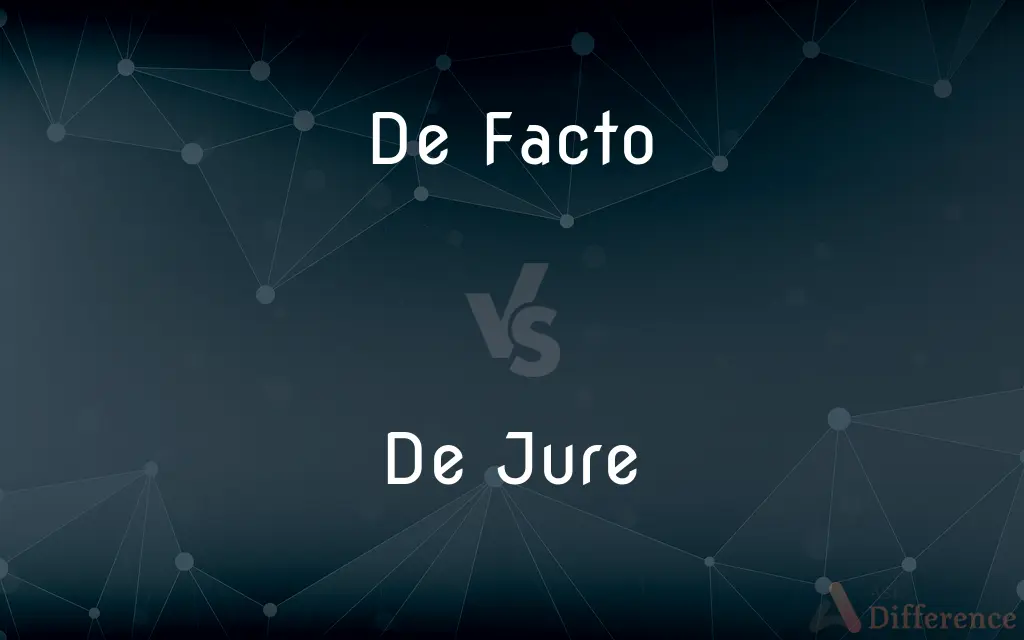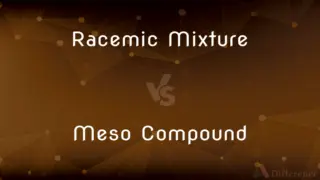De Facto vs. De Jure — What's the Difference?
By Tayyaba Rehman — Published on December 19, 2023
De Facto means "in fact" or in reality, while De Jure means "by law" or legally established.

Difference Between De Facto and De Jure
Table of Contents
ADVERTISEMENT
Key Differences
De Facto refers to situations, conditions, or practices that exist in reality, even if not legally recognized. It describes circumstances that have come to be accepted over time, regardless of their legal status.
De Jure, on the other hand, describes what is legally established or recognized by law. It refers to formal and official status, often enshrined in laws or legal frameworks.
De Facto situations might not align with De Jure regulations. For instance, a De Facto standard in technology may not be the De Jure, or legally sanctioned, standard.
Conversely, a De Jure government may not hold De Facto power if it lacks control or widespread acceptance. In such cases, the De Jure status doesn’t reflect the actual situation.
In terms of language and usage, De Facto is often used to describe the prevailing state of affairs, while De Jure emphasizes the formal or legal aspects.
ADVERTISEMENT
Comparison Chart
Meaning
In reality or in practice
According to law or by legal right
Emphasis
Actual situation or common practice
Legal recognition or official status
Example
A De Facto standard
A De Jure legal right
Relation to Law
May not align with legal status
Based on legal framework
Common Usage
Describing prevailing conditions
Highlighting formal legality
Compare with Definitions
De Facto
Existing in reality, despite not being legally recognized.
English is the de facto language of international business.
De Jure
According to legal right or formal status.
She held the de jure title of CEO.
De Facto
Practically in effect, though not formally established.
The leader ruled the country de facto, but not de jure.
De Jure
Based on law, as opposed to actual practice.
It was a de jure monarchy, but a democracy in practice.
De Facto
In practice or in use, regardless of legal status.
He is the de facto head of the family.
De Jure
Established or sanctioned by law.
The constitution guarantees de jure equality.
De Facto
Commonly accepted or recognized, but not official.
The area was a de facto nature reserve.
De Jure
Officially recognized or legally binding.
The region gained de jure independence.
De Facto
Reflecting actual practice or state of affairs.
The metric system is the de facto standard in science.
De Jure
By legal entitlement or formal decree.
The court granted de jure custody of the child.
Common Curiosities
How is De Jure different from De Facto?
De Jure refers to legal recognition, while De Facto refers to the actual situation.
How do courts view De Facto situations?
Courts may recognize De Facto situations depending on context.
What does De Facto mean?
It means existing in reality or practice, not necessarily legally.
Is De Jure status always accompanied by De Facto?
Not always; something can be De Jure without being De Facto.
Are De Facto standards legally binding?
No, they are accepted in practice but not legally enforced.
Is De Jure status permanent?
It can change if laws or official recognition change.
Can De Facto become De Jure?
Yes, if the practice gains legal recognition.
Can laws change a De Facto situation to De Jure?
Yes, through legal recognition or regulation.
Can something be De Facto but not De Jure?
Yes, if it exists in practice but isn't legally recognized.
Are international borders always De Jure?
Not necessarily; some are De Facto and disputed.
Can a government be both De Facto and De Jure?
Yes, if it's both legally established and effectively in control.
How do De Facto relationships differ from De Jure?
De Facto relationships exist in practice, while De Jure relationships have legal recognition.
Does De Jure always reflect reality?
No, there can be discrepancies between law and actual practice.
Does De Jure imply fairness or justice?
Not necessarily; it refers to legality, not moral fairness.
How important is De Facto recognition in politics?
It can be crucial, as actual control often matters more than legal status.
Share Your Discovery

Previous Comparison
Racemic Mixture vs. Meso Compound
Next Comparison
Aneroid Barometer vs. Mercury BarometerAuthor Spotlight
Written by
Tayyaba RehmanTayyaba Rehman is a distinguished writer, currently serving as a primary contributor to askdifference.com. As a researcher in semantics and etymology, Tayyaba's passion for the complexity of languages and their distinctions has found a perfect home on the platform. Tayyaba delves into the intricacies of language, distinguishing between commonly confused words and phrases, thereby providing clarity for readers worldwide.












































